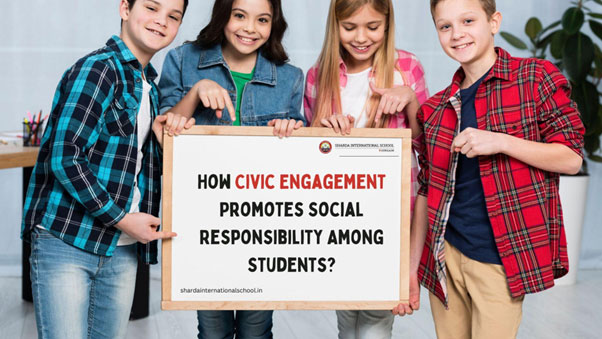How Civic Engagement Promotes Social Responsibility Among Students
 Have you ever noticed how kids light up when they’re part of
something bigger than themselves? There’s something about getting
your hands dirty for a good cause that changes the way you see the
world. Maybe it’s that first experience of volunteering at a
shelter, planting trees in the neighborhood, or leading a
fundraiser at school. Whatever the case, once a student steps into
the world of civic engagement, it’s like flipping a switch.
Suddenly, they’re not just passive observers of the world—they’re
part of shaping it.
Have you ever noticed how kids light up when they’re part of
something bigger than themselves? There’s something about getting
your hands dirty for a good cause that changes the way you see the
world. Maybe it’s that first experience of volunteering at a
shelter, planting trees in the neighborhood, or leading a
fundraiser at school. Whatever the case, once a student steps into
the world of civic engagement, it’s like flipping a switch.
Suddenly, they’re not just passive observers of the world—they’re
part of shaping it.
And that shift? It’s powerful. It plants the seeds of social
responsibility in ways no textbook ever could.
Civic Engagement Is Absolutely More Than Just a Buzzword
When people hear "civic engagement," they picture big speeches,
rallies, or signing petitions. But it’s so much more than that.
It’s about small, everyday actions—helping an elderly neighbor,
raising awareness about an issue, or even voting in a student
council election. These experiences teach kids one of the most
valuable lessons in life: they have the power to change things.
The beauty of civic engagement is that it sneaks up on you. One
moment, you’re volunteering just to earn extra credit; the next,
you realize you actually care. And that’s where social
responsibility kicks in.
Reasons Civic Engagement Promotes Social Responsibility Among
Students
Turning ‘Me’ into ‘We’
Kids, by nature, live in their own little worlds—school, hobbies,
friends, repeat. But when they get involved in civic engagement,
that world expands. Suddenly, they see that not everyone has the
same privileges they do. Maybe they help pack meals for the
underprivileged and realize how many families struggle to put food
on the table. Maybe they visit a senior center and understand how
lonely some people feel. These moments aren’t just
eye-opening—they plant seeds of empathy.
And empathy? That’s the golden ticket to social responsibility.
When students start seeing issues through someone else’s eyes,
they don’t just shrug and walk away. They ask,
What can I do?
The Ripple Effect of Getting Involved
One of the coolest things about civic engagement is how it
spreads. A single act of kindness has this wild domino effect. A
kid who organizes a school recycling program might inspire their
classmates to be more mindful of waste. A teenager who raises
awareness about cyberbullying might make others think twice before
hitting “send” on a mean comment.
It’s like tossing a stone into a pond—the ripples keep going. And
once students feel the rush of making a difference, they don’t
just stop. It becomes a part of who they are.
Confidence Booster? Absolutely.
Have you ever notice how kids who participate in civic engagement
seem to carry themselves differently? It’s because they’ve seen
proof that their voice matters. They’ve led projects, solved
problems, and stepped up when no one else did.
Think about it—when a student stands in front of their school and
speaks about a cause they believe in, they’re not just helping
others. They’re proving to themselves that they’re capable. And
that kind of confidence? It sticks.
Real-World Lessons You Can’t Learn in a Classroom
No disrespect to math and science (we love them too!), but some of
the most valuable life lessons happen outside four walls. Civic
engagement teaches things schools don’t always cover—conflict
resolution, teamwork, leadership, and resilience.
A student organizing a fundraiser for disaster relief quickly
learns it’s not all smooth sailing. Maybe people don’t donate as
much as expected. Maybe logistics become a nightmare. But figuring
things out, adapting, and pushing through? That’s where real
growth happens.
From ‘Because I Have To’ to ‘Because I Want To’
In the beginning, a lot of students get into civic engagement
because it’s part of an assignment or a requirement. And hey,
that’s fine! But something funny happens along the way. It stops
feeling like a chore.
The more students engage, the more they start caring. They take
ownership of causes, come up with ideas, and look for ways to
contribute without being told to. That’s when social
responsibility isn’t just a concept—it’s a habit.
It’s Not About Being a Hero—It’s About Showing Up
One of the biggest misconceptions about civic engagement is that
you have to do something huge to make a difference. Nope. Not
true. It’s the small, consistent actions that add up.
Holding the door open. Speaking up when something feels wrong.
Helping a struggling classmate. These might not make headlines,
but they build character. And over time, they create a generation
of students who don’t wait for someone else to fix things—they
step in.
Why Schools Play a Huge Role
Kids spend a massive chunk of their time at school. That means
schools have a golden opportunity to shape how they see the world.
When schools actively encourage civic engagement, they’re not just
teaching students how to be good citizens; they’re shaping future
leaders.
Sharda International School is one of the
Top schools of Gurgaon
and understands this well. By fostering a culture where students
are encouraged to think beyond themselves, participate in
community projects, and take an active role in societal issues,
they’re preparing young minds to be the changemakers of tomorrow.
Final Thoughts
Raising a generation that cares is more important than ever. Civic
engagement isn’t just about helping others—it’s about shaping
students into thoughtful, responsible individuals who understand
their role in society. And when that happens? Well, the future
looks a whole lot brighter.